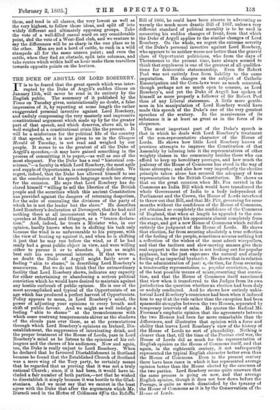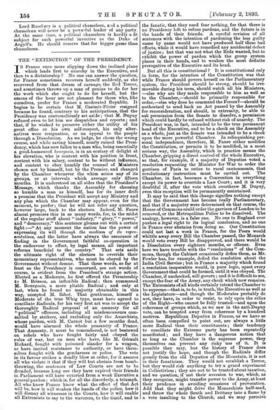THE DUKE OF ARGYLL ON LORD ROSEBERY.
IT is to be feared that the great speech which was inter- rupted by the Duke of Argyll's sudden illness on January 15th, will never be read in its entirety by the English public. The summary of it published by the Times on Tuesday gives, unintentionally no doubt, a false impression of it, by reporting at some length the rather exaggerated personal invective against Lord Rosebery, and unduly compressing the very masterly and impressive constitutional argument which made up by far the greater part of that speech, and which deserves, above all, to be well weighed at a constitutional crisis like the present. It will be a misfortune for the political life of the country if that speech, as it is now given to us in the Glasgow Herald of Tuesday, is not read and weighed by our people. It seems to us the greatest of all the Duke of Argyll's speeches,—it may have gained something in the process of committing it to paper,—as well as one of the most eloquent. For the Duke has a real "historical con- science,"—a faculty in which Lord Rosebery, the most agile and supple of Opportunists, is conspicuously deficient. We regret, indeed, that the Duke has allowed himself to use at the conclusion of his speech language much too strong for the occasion. He says that Lord Rosebery has de- clared himself " willing to sell the liberties of the British people and the securities which this ancient Constitution has provided against the dangers of returning despotism, for the sake of concealing the divisions of the party of which he is not the leader but the slave." He describes Lord Rosebery's declaration at Devonport, that he had said nothing there at all inconsistent with the drift of his speeches at Bradford and Glasgow, as a "brazen declara- tion." And, indeed, he treats a Minister who, in our opinion, hardly knows when he is shifting his tack only because the wind is so unfavourable to his purpose, with the view of beating up against it, and when he is shifting it just that he may run before the wind, as if he had really had a, great public object in view, and were willing either to pursue it or to abandon it, just as might best suit his own personal interests. If that were so, no doubt the Duke of Argyll might fairly avow a feeling " akin to shame," in describing Lord Rosebery's manoeuvres. But we do not think that the extraordinary facility that Lord Rosebery shows, indicates any capacity for either entertaining or abandoning a serious political conviction which he would have desired to maintain against any hostile outbreak of public opinion. He is one of the most accomplished and typical of the Opportunists of an age which has produced a perfect harvest of Opportunists. Policy appears to mean, in Lord Rosebery's mind, the power of adjusting your opinions to every breath and shift of public favour. And we might as well indulge a feeling " akin to shame " at the tremulousness with which some unstrung temperaments shiver as the shadows of the clouds pass over them, as at the permutations through which Lord Rosebery's opinions on Ireland, Die- establishment, the suppression of intoxicating drink, and the proper treatment of the House of Lords, pass in Lord Rosebery's mind as he listens to the opinions of his col- leagues and the cheers of his audiences. Now and again, too, the Duke is really unjust to Lord Rosebery. When he declared that he favoured Disetablishment in Scotland because he found that the Established Church of Scotland was a mere wing of the Tory party, he certainly meant that he regarded that as proving that it was not a truly national Church ; since, if it had been, it would have in- cluded a fair number of both parties,—not that he wished to disestablish it simply because it was hostile to the Glad- stonians. And we must say that we cannot in the least agree with the Duke that after the arguments which Mr. Disraeli used in the Heise of Commons ii 3n the Reform Bill of 1866, he could have been sincere in advocating so warmly the much more drastic Bill of 1867, unless a very different standard of political morality is to be used in measuring his sudden changes of front, from that which the Duke of Argyll applies to the similar changes of Lord Rosebery. On the whole, we regret the extreme severity of the Duke's personal invective against Lord Rosebery, who appears to us neither worse nor better than the general class of Opportunist politicians, who from the days of Theramenes to the present time, have always seemed to think that suppleness is one of the greatest of all qualifica- tions for democratic statesmanship. Even Sir Robert Peel was not entirely free from liability to the same imputation. His changes on the subject of Catholic Emancipation and the Corn-laws were as much censured, though perhaps not so much open to censure, as Lord Rosebery's, and yet the Duke of Argyll has spoken of himself as more properly a follower of Sir Robert Peel than of any Liberal statesman. A little more gentle- ness in his manipulation of Lord Rosebery would. have made this speech of the Duke's one of the very greatest speeches of the century. In the massiveness of its substance it is at least as great as in the force of its eloquence.
The most important part of the Duke's speech is that in which he deals with Lord Rosebery's treatment of the non-representative character of the House of Lords. He shows how little Lord Rosebery knows of previous attempts to improve the Constitution of that Assembly by infusing into it the representatives of other weighty classes in the community besides those who can afford to keep up hereditary peerages, and how much the jealousy of the House of Commons has stood in the way of these attempts ; and also how very imperfectly the elective principle taken alone has secured the adequacy of true representation in the British Constitution. He shows us that on the great occasion when Mr. Fox carried in the Commons an India Bill which would have transferred the whole Government of India to a body independent of Parliament and the Crown, the House of Lords interfered to throw out that Bill, and that Mr. Pitt, governing for some months without the confidence of the House of Commons, yet obtained so completely the confidence of the Commons of England, that when at length he appealed to the con- stituencies, he swept his opponents almost completely from the stage, and got a new House of Commons which ratified entirely the judgment of the House of Lords. He shows that election, far from securing absolutely a true reflection of the feeling of the people, sometimes secures nothing but a reflection of the wishes of the most adroit wirepullers, and that the taciturn and slow-moving masses give their real support to the man who is not looking out for popular applause, but who just expresses the natural and sturdy feeling of an impartial bystander. He shows that in relation to the administration of justi e, election, far from securing a trustworthy representation oi popular conviction, is one of the best possible means of misrepresenting that convic- tion, and that the House of Commons itself sanctioned that view when it transferred to the Judges from its own jurisdiction the question whether an election had been duly or unduly conducted. And he shows how entirely unhis- torical Lord Rosebery's conscience had been when it induced him to say at the rule rather than the exception had been spasmodic struggles between the two Houses, separated by temporary intervals of calm. He quotes the Radical Mr. Freeman's emphatic opinion that the agreements between the two Houses had been far more remarkable than the differences, and illustrates that opinion with a force and ability that leaves Lord Rosebery's view of the history of the House of Lords no sort of plausibility. Nothing is clearer than that, till the time of the Puritan civil war, the House of Lords did as much for the representation of English opinion as the House of Commons itself, and that again, in the eighteenth century, it not unfrequently represented the typical English character better even than the House of Commons. Even in the present century there have been cases in which it has represented average opinion better than the House elected by the caucuses of the two parties. Lord Rosebery seems quite unaware that the same process is going on now, and that average English opinion, though it does not bow down before the Peerage, is quite as much dissatisfied by the tyranny of the House of Commons as it is by the Conservatism of the House of Lords. Lord Roselery is a political chameleon, and a political chameleon will never be a powerful leader of any party. At the same time, a political chameleon is hardly a tit subject for such powerful invective as the Duke of Argyll's. He should reserve that for bigger game than chameleons.



































 Previous page
Previous page